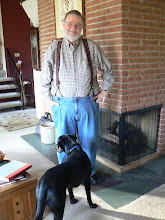David and Ken were both very gracious, and came at our conversation from their very different perspectives: Ken as a church historian, David as a cross-cultural professor and a child of missionary parents. Among other things, they offered some extremely helpful questions to consider.
Do we want to focus on pastoral leadership or plural leadership? In other words, in this study I'm doing, do I want to explore further dimensions of pastoral leadership for a new day, or do I want to expand the conversation and explore further dimensions of plural leadership... or developing multiple leaders in a congregation? It's clear to me that both aspects of the question are important. However, I think that plural leadership is something that we, as a Church, are going to have to concentrate on more and more. What gifts, skills, and support can we provide the elders and deacons of our congregations in order to help them exercise their gifts for ministry in a congregation that is moving into a new way of living out its faithfulness to the Gospel of Jesus Christ?
One of the things Ken and David asked is if congregations want to be ethnically diverse or homogeneous? As our society continues to evolve into a rich mosaic of cultures, I think that most of our congregations will need to explore what it will mean to welcome - not just into worship, and not just into membership, but also into leadership - a broader spectrum of ethnic people.
They identified three pre-corporate models for the church: intentional communities in covenantal relationships, house churches, and store-front churches. I've got some leads on some of these kinds of congregations, and will be following up on conversations with them during this part of my sabbatical.
When you look at two or more organizations sharing a building, it's important to remember that sharing space is not the only issue. Sharing time is also a critical issue to work out.
From David's international perspective, he asked a fascinating question: "If you want to look at alternative ways of being church, then where are the Africans in your community, and what are they doing?" It makes me realize that I need to have some conversations with our Sudanese Presbyterian brothers and sisters.
Subscribe to:
Post Comments (Atom)

No comments:
Post a Comment